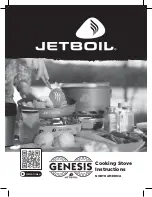
17
Vermont Castings Concord
30005102
how the concord works
Combustion control is achieved in the Concord through
two separate air delivery systems.
The
primary air control lever
, located at the left rear
corner of the stove, controls the amount of incoming pri-
mary air for starting, maintaining, and reviving the fire.
More air entering the stove makes the fire burn hotter
and faster, while less air prolongs the burn at a lower
heat level.
For the greatest air supply and maximum heat output
(but the shortest burn time), move the lever to the left
most position. For a fire that will last longer with less
heat, move the lever to the right. You can set the lever
anywhere in between the upper and lower extremes.
do Not uSe chemicalS or fluidS to
Start the fire. do Not burN garbage
or flammable fluidS Such aS gaSoliNe,
Naptha, or eNgiNe oil. alSo, Never uSe
gaSoliNe-type laNterN fuel, keroSeNe,
charcoal lighter fluid, or Similar
liquidS to Start or “freSheN up” a fire.
keep all Such liquidS well away from
the coNcord while it iS iN uSe.
cautioN: the coNcord will be hot
while iN operatioN. keep childreN,
clothiNg aNd furNiture away. coNtact
may cauSe SkiN burNS.
do Not overfire thiS heater. overfir-
iNg may cauSe a houSe fire, or caN
reSult iN permaNeNt damage to the
Stove. if aNy part of the Stove glowS,
you are overfiriNg.
The Concord features an automatic thermostat to
ensure an even heat output at any manual setting
you select. As the fuel burns, the thermostat reacts to
the heat radiating from the stove surface and, conse-
quently, adjusts the air shutter attached to it. As the fire
intensity (and heat output) builds, the thermostat slowly
closes the air shutter, thereby restricting incoming com-
bustion air. As the fire intensity then wanes (and heat
output lessens), the thermostat responds and gradually
opens the air shutter which allows more combustion air
to again enliven the fire. This ebb and flow action func-
tions continuously to prolong the burn cycle until the
fuelbed is exhausted.
Another separate supply of oxygen is delivered to the
upper area of the firebox to support combustion of
gases released from the main fuel bed. This
Second-
ary air
enters the stove through two, unrestricted inlets
and is heated while passing through separate channels
before being delivered through three stainless steel
multi-ported tubes located at the top of the firebox.
burn only high-quality wood
the coNcord iS deSigNed to burN Natural
wood oNly; do Not burN aNy other fuelS.
You will enjoy the best results when burning wood that
has been adequately air-dried. Avoid burning “green”
wood that has not been properly seasoned. The wood
should be no longer than 18” (457 mm) in length, how-
ever, you will find that shorter wood lengths ease refuel-
ing and promote the most efficient combustion.
The best hardwood fuels include oak, maple, beech,
ash, and hickory that has been split, stacked, and air-
dried outside under cover for at least one year.
For areas that do not have a supply of hardwood, com-
monly burned softwoods include tamarack, yellow pine,
white pine, Eastern red cedar, fir, and redwood. These
too should be properly dried.
Keep wood a safe distance from the heater and keep
it out of the areas around the heater used for refueling
and ash removal.
use the air control Setting that
works best for you
No single air control setting will be appropriate for every
situation. Settings will differ depending on the quality of
the fuel, the amount of heat desired, and how long you
wish the fire to burn.
The control setting also depends on your particular
installation’s “draft,” or the force that moves air from the
stove up through the chimney. Draft is affected by such
things as the length, type, and location of the chimney,
local geography, nearby obstructions, and other factors.
Too much draft may cause excessive temperatures in
the Concord, and could even damage it. On the other
hand, too little draft can cause backpuffing into the
room and/or the “plugging” of the chimney.
How do you know if your draft is excessively high or
low? Symptoms of too much draft include an uncontrol-
lable burn or a glowing-red stove part. A sign of inad-
equate draft is smoke leaking into the room through the
stove or chimney connector joints, low heat, and dirty
glass.
operation












































